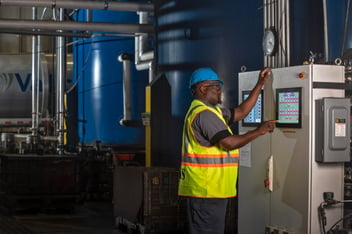Oil recovery and oily wastewater services are a crucial part of most industrial processes. Without these services, it would be impossible for companies to operate their facilities safely and efficiently. Nearly all manufacturing processes produce oily wastewater, so the proper processing of this waste is imperative to not only comply with government regulations, but as an effort in good faith to reduce potential negative environmental impacts.
What is Considered Oily Wastewater?
- Oily wastewater is a general term for any water contaminated with oil, including storm water runoff and waste streams from industrial facilities. This may contain fats, lubricants, cutting fluids, , diesel oils, and lighter fuel oils. Many industries produce oily wastewater, from restaurants to mechanic shops, to a variety of manufacturing operations.
- These oils can be separated from water using many different methods, resulting in purified water and clean oil that can then be recycled or reclaimed for further use. The separation method used varies depending on several factors, including the type of oil in question as well as the nature of the contamination (i.e., whether it's fresh or saltwater).
Oily Wastewater & Oil Recovery Services is a Way to Clean Oil-Contaminated Water to Reuse and Recycle.
The oily wastewater generated by various industrial manufacturing processes goes through multiple advancing stages of separation and filtration to ultimately turn out clean, reusable oil and purified water.
These stages include skimming, gravity separation, coagulation, chemical treatment, emulsification, microfiltration, ultrafiltration, and nanofiltration, among others.
In recent years, cutting-edge technology combined with established methods has enabled oily wastewater to be safely processed at a level of efficiency not available in previous generations.
Why Are Oily Wastewater & Oil Recovery Services Important?
It’s Good for the Environment
Oily wastewater contamination affects drinking water and groundwater resources, causes air pollution, endangers marine ecosystems as well as human health, and affects farmers’ ability to produce healthy crops. Proper treatment of this oily wastewater is crucial to reduce its effect on the environment and humans.
The recovery of used oil for recycling and reuse provides environmental benefits in three ways: it prevents the used oil from damaging the environment by ending up in landfills and waterways; it allows the water to be extracted and purified for reuse; and it reduces the need to produce more oil and oil derivatives from deposits in the earth.
A Sound Economic Decision
Businesses that use oily wastewater & oil recovery services send less waste to landfills, which saves those companies on waste disposal expenses. Using these services also decreases their carbon footprint, which can rally the confidence of investors and consumers.
These companies can use this reclaimed oil as fuel or even sell it back into their local communities at affordable prices—so both the company and their communities benefit from this process.
How Does Oily Wastewater Affect the Environment?
Oily wastewater is one of the largest components of the nation’s industrial waste stream, accounting for more than two million tons per year. International organizations have taken note and are developing strategies to combat the problem of oily wastewater management worldwide.
Most people are familiar with what happens when an oil spill occurs: we see photos from media outlets showing how animals were affected or how beaches were left blanketed in tar. But what most people don’t see are all of the ways these spills affect our environment for years after they occur.
When spilled into water bodies, oily wastewater can be transported by currents and wind to other ecosystems. The presence of oily wastewater can cause damage to marine life or contaminate drinking water sources like rivers and lakes used by downstream communities.
It also contaminates the soil, which may affect crop production further downstream if not detected early enough and properly remediated.
What’s more, common industrial processes produce an ongoing stream of oily wastewater that most people don’t even realize could be contaminating the environment every day.
Why Should Companies Care About Oil Recovery Services?
With oil recovery services, your company will:
- Improve the environment. Oil and wastewater are a hazard to the local ecosystem, particularly when they result in flooding or spills that pollute groundwater.
- Increase brand reputation. Customers and investors alike expect companies to safeguard the environment and keep their facilities free from hazardous waste. Companies that engage in oil recovery services demonstrate how seriously they take their commitment to protect the environment by removing toxins before damage occurs.
- Increase profitability. By using a reputable company for oily wastewater management, your company not only contributes to a healthier environment for everyone but can save money through oil and water recycling and reuse, as well as avoid costly fines associated with an oily wastewater disposal violation.
How Valicor Supports These Efforts
When you're looking for an oily wastewater and recovery company, you want a company with the right equipment and expertise.
As the nation’s first ISO 14001 Certified wastewater treatment company, Valicor is leading the way in environmentally conscious wastewater treatment and oil recovery. We recover and recycle over 30 million gallons of used oil each year, and with over 20 locations across the nation and growing, Valicor is the company you can trust with oily wastewater treatment.
We know oily wastewater is a prime contributor to soil and water pollution from various commercial and industrial processes, but as a top wastewater treatment company, Valicor is committed to making oily wastewater a problem of the past.
Our experts are here to answer your questions and provide the solutions you need to reach your sustainability and economic goals. Contact us today to learn more about how Valicor can support your company’s goals to contribute to a healthier environment.



